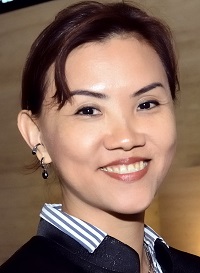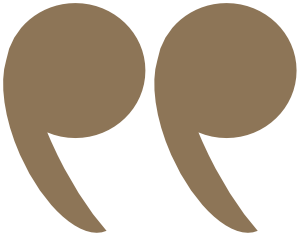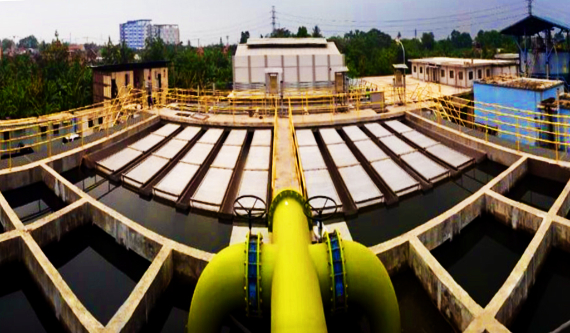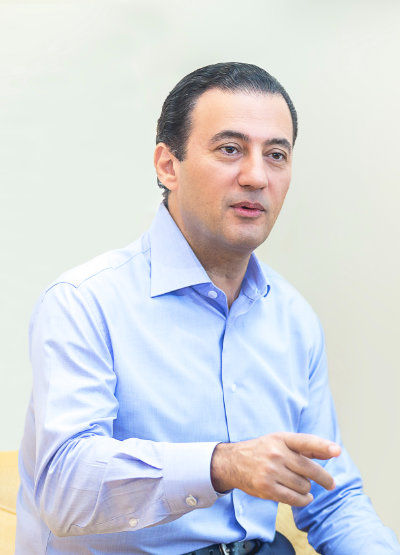 This article by Jennifer Tan (left, Director, Research & Products, Equities & Fixed Income, at the Singapore Exchange) was published in SGX's kopi-C: the Company brew series on 3 November 2017. The article is republished with permission.
This article by Jennifer Tan (left, Director, Research & Products, Equities & Fixed Income, at the Singapore Exchange) was published in SGX's kopi-C: the Company brew series on 3 November 2017. The article is republished with permission.
|
A veritable human dynamo, Lebanese-born Simon Melhem is not one to let grass grow under his feet.
The company's inception dates back to 2009, when Melhem teamed up with Bahraini and Saudi investors to set up a water development and investment vehicle for the Middle Eastern market. |
Pole Position
In February 2015, Moya sold a 29% stake via placement of new shares to Indonesia-based hydroelectric power plant operator Tamaris Infrastructure, controlled by Indonesian billionaire Anthony Salim. A year later, Tamaris raised its shareholding in Moya to 62% after subscribing for the company's rights shares.
"We needed to expand our balance sheet, and it was good to have a local Indonesian partner, so after discussions with water companies and private equity firms, we went with Tamaris, because there were many similarities between our business models," Melhem said.
Moya did not stop there. In June this year, the company completed a US$92.9 million acquisition of Singapore-based Acuatico, which also develops and operates water treatment and distribution facilities in Indonesia. The company provides water services through its Aetra brand to eastern Jakarta and parts of Tangerang.
This acquisition boosts Moya's total water treatment capacity to 13,935 lps, catapulting it to number one position in Indonesia's water market.
|
We decided the Indonesian market would offer the best returns relative to effort and capital investment. - Simon Melhem Moya Holdings Asia (Photo: Company) |
Given the country's size - it is Southeast Asia's largest economy and the world's fourth-most populous nation - growth prospects of its water sector are naturally robust.
The sprawling archipelago has a population of more than 260 million, but only close to 70% have access to safe drinking water, according to data from the country's Central Statistics Agency.
The government has pledged to achieve a coverage target of 100% access to safe drinking water by 2019 under the National Medium Term Development Plan (RPJMN 2015-2019).
"The level of development in the water sector and access to water services are still below what it should be for countries of similar GDP and population size," Melhem noted.
"And we're well-positioned to capitalise on this."
Moya has a current market capitalisation of over S$290 million. Its shares have generated a price gain of 96.2% in the 2017 year-to-date, compared with gains of 17.7% and 17.4% respectively for the benchmark Straits Times Index and FTSE ST All-Share Index.
Its Singapore-listed peers are Citic Envirotech Ltd, SIIC Environment Holdings Ltd, Sanli Environment Ltd, China Everbright Water Ltd, Hyflux Ltd, and Darco Water Technologies Ltd.
Key competitors in Indonesia include PT PAM Lyonnaise Jaya, a unit of French waste and water treatment group Suez Environnement, with a total capacity of 10,100 lps, as well as PT Adhya Tirta with a capacity of 7,230 lps, and PT Traya with a total capacity of 4,400 lps.
Right now, the stars are aligned, and Moya is firing on all cylinders.
"We've got all the basics covered - economies of scale, a good track record, access to debt and equity. We can go full speed ahead in terms of growing the company," Melhem said.
| ♦ Making Inroads | ||||||||||||||
|
With this goal in mind, Moya has adopted a proactive approach in developing new business leads.
Such strategies have set Moya apart from the competition, and enabled the company to make inroads into the domestic water market, he added. |
||||||||||||||
Emotional High
With water being such an emotional story, Melhem sometimes lies awake at night wondering what he will read in local newspapers the next morning.
"The water sector gets lots more attention than toll roads or power plants. Rain does not equate water from your tap. You need capex to deliver treated water to homes, and while water should be affordable, it cannot be free," he noted.
And in many instances, the government cannot provide water to citizens without the private sector's participation, he added.
"The resentment arises because people think private sector involvement raises the cost of water. That is not true - the role of the private sector is to boost the efficiency of delivery, allowing the government to deliver water more cheaply. And in some cases, without the private sector, the city may not be able to provide treated water to begin with."
That's the case in Jakarta, where Acuatico's Aetra Air Jakarta cooperation agreement is due for renewal in January 2023. Melhem sees no reason why this contract would not be extended.
The Indonesian capital, like many other cities in Southeast Asia, remains under-served, with high non-revenue water (NRW) from theft or leakage, and low connections. Alternative means to boost water service levels - such as tapping ground water or providing non-piped transportation - are expensive and non-sustainable.
 The role of the private sector is to boost the efficiency of delivery, allowing the government to deliver water more cheaply. And in some cases, without the private sector, the city may not be able to provide treated water to begin with. The role of the private sector is to boost the efficiency of delivery, allowing the government to deliver water more cheaply. And in some cases, without the private sector, the city may not be able to provide treated water to begin with.- Simon Melhem Moya Holdings Asia |
"We can see that the city is focused on increasing water connections, and that requires capital investment and technology know-how," he noted.
"The Indonesian President has, on many occasions, pushed for private-public partnerships because national and local budgets are insufficient to achieve these goals.
There's definitely a role for the private sector to play, and the needs are today, not seven years from now."
And through it all, Melhem's emphasis on the business is unwavering. "Work is my focus - that keeps me going," he admitted with a grin.
"One of the most satisfying moments for me is the signing of the cooperation agreement, because so much energy and effort goes into putting all the concepts down on paper, and finally you see it in print," he added.
"While there are other milestones that come after that, such as during the implementation process, the contract is the highest point - that's the instrument that will survive for the next 20 to 25 years."
And the key to achieving that success is persistence, said Melhem, who has two daughters aged five and 13, and a son, 11.
"I always tell my kids, if you have persistence, you will eventually succeed. So never, ever give up - your worst enemy is giving up!"
Financial results
| Year ended 31 December (S$ '000) | 2016 | 2015 | 2014 | 2013 |
| Revenue | 19,326 | 9,820 | 9,136 | 21,042 |
| Gross profit | 2,325 | 1,326 | 2,107 | 2,657 |
| Net profit / loss attributable to owners | 6,706 | -357 | -834 | -10,058 |
| Quarter ended 30 June (S$ '000) | 2QFY2017 | 2QFY2016 |
yoy chg |
| Revenue | 18,642 | 3,986 | 368% |
| Gross profit | 6,329 | 846 | 633% |
| Net profit / loss attributable to owners | 1,160 | 1,393 | -17% |
Source: Company data
| Outlook & Risks | ||
|
||
Moya Holdings Asia Limited
Moya is engaged in the investment and development of total water solutions in Indonesia. These solutions include the collection of raw water, treatment of captured water and distribution of clean water.
The Group has three build, operate and transfer (BOT) projects under contract and development by its subsidiaries - PT Moya Bekasi Jaya, PT Moya Tangerang, and PT Moya Makassar. In June 2017, the Group completed the acquisition of Acuatico Pte Ltd.
Acuatico is an investment holding company incorporated in Singapore that develops and operates water treatment facilities and associated distribution pipelines for the distribution of clean water in Indonesia, through three subsidiaries - PT Aetra Air Jakarta, PT Aetra Air Tangerang and PT Acuatico Air Indonesia (the Acuatico Group).
Together with the Acuatico Group's water treatment plants, Moya serves the following regions in Indonesia - Bekasi (East of Jakarta), Tangerang (West of Jakarta), Eastern Jakarta, Northern Jakarta and Central Jakarta. The Group is one of the leading private players in Indonesia's water treatment sector with a total capacity of 13,935 litres per second.
For its 2nd quarter results for the period ended 30 June 2017, click here.
The company website is: www.moya.com.
The ccompany's Stock Facts page is here.







